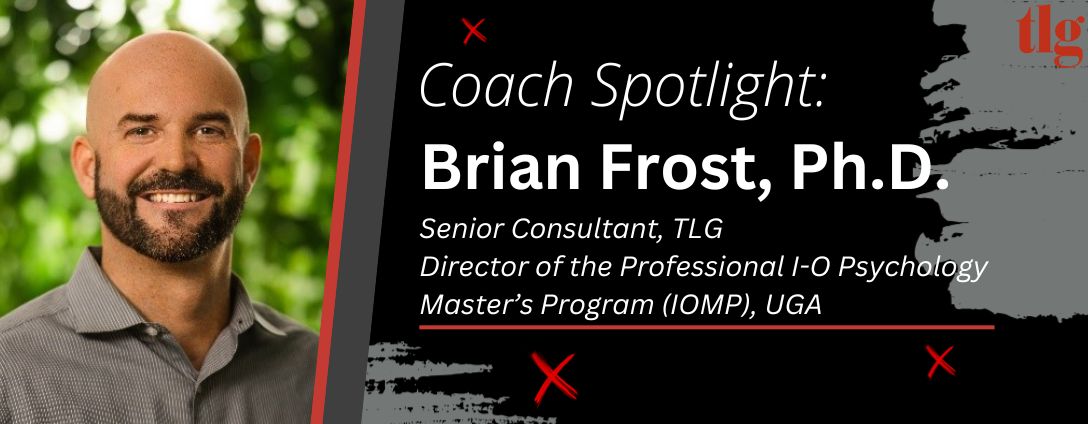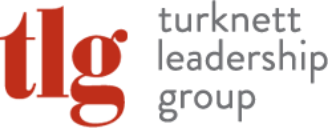
By Jonathan Palombo
Marketing ManagerDr. Brian Frost’s core passion and skill is as an educator and developer of people. Not only is he a Senior Consultant with TLG, he is also Director of the Professional I-O Psychology Master’s Program (IOMP) at the University of Georgia, where he both teaches and manages the administrative responsibilities of the program. Dr. Frost’s true differentiator is in his personable and authentic approach to engaging with clients and caring for their success and that of their people. We decided to shine the spotlight on Brian to learn more about his storied career.
Q: As an industrial-organizational psychologist, what are some of the biggest challenges you see individuals facing in the workplace today?
One challenge that is emerging rapidly is the dehumanization of work. With virtual work becoming commonplace and the explosion of AI applications, it’s going to become ever more challenging to create emotional connections at work. While this lack of connection and virtual work has had positive influences in people’s ability and willingness to choose where they work during a hot job market, in tougher economic times, it will also make it easier for organizations to let go of people in ways that create a lot of negative emotions. Further, we know that social connection and support is essential to mitigating the effects of stress and negative experiences at work. Organizations with a largely virtual workforce need to be creating ways to enable this connection away from a desk and a computer screen. I could write paragraphs on this, but, essentially, engagement as we currently measure and monitor it is going to become an increasingly difficult effort.
Q: What has been the highlight of your career as an industrial-organizational psychologist?
I was a full-time consultant to industries for 12 years before taking my current full-time academic role 9 years ago where I was tasked with building this professional graduate program at UGA. While I have built some processes and solutions that I’m very proud of and have had clients recognize me for the level of care I showed for the success of their business, none of that tops the opportunity I’ve had in my current role to influence the growth of others on an individual basis. I’ve never heard a client say, “You changed my life”, but I’ve heard that from several professional graduate students. It’s been an honor to be able to leverage my knowledge, experience, and relationships to open doors for others and set them up for success in achieving their goals and through their work, in having a positive impact on the employment experiences of others.
Q: How can individuals practice authenticity in the workplace? What does it mean to be authentic?
Authenticity starts and ends with humility. We must be willing to listen to and accept feedback in order to develop an accurate self-awareness. We also have to create a feeling in others we work with that makes them comfortable in giving us accurate and timely feedback on a regular basis. This feedback is not necessarily about us but about our contributions and decisions at work and the impact that has on others. All of that requires humility to accept our faults, to recognize that we can’t “fix” all of them, and a willingness to engage others whose strengths might be a better fit for the moment.
Q: What do you enjoy most about leading students through UGA’s Master Program in Industrial-Organizational Psychology?
Besides what was already mentioned, I enjoy the level of engagement that working professional students bring to the classroom. It’s beyond anything you experience with traditional undergraduate and graduate students. Our professional students average 7 years of full-time work experience prior to joining the program. They recognize the opportunity they have and the money they are investing in themselves, and they want to squeeze every ounce of value out of the learning experience. Students share how the topics have been applied, correctly or incorrectly, in their work experiences. They share resources and best practices (and what not to do). It creates an incredible classroom experience where everyone is a teacher in different moments.
Q: How can coaching equip managers to become better people-leaders?
Being an effective people-leader essentially boils down to the concept of perceived organizational support. Do your people feel that you care for them and want the best for them? Every person on your team must feel this way, and each person varies in their needs, desires, and goals. Very few leaders can naturally make all of their direct reports feel this way. Most leaders need to make a concerted effort to achieve this and do not make the time to do it. Coaching provides a structured, supportive process to make that effort intentional. Coaching can ensure you ask effective questions with your people, engage with them appropriately throughout the day, and give them the right opportunities.
Much like many of us with demanding personal lives struggling to consistently find the time to exercise every day, we have to be intentional about it and have support in that effort.
Q: What skills can leaders develop to engage their employees more effectively and intentionally?
Asking the right questions at the right time. On at least a weekly basis near the end of the week, check in with your direct reports individually (not in a team meeting) and ask: What is going well? What is not going well? What, if any, support would be most helpful from me?

